Art & Exhibitions
British Museum Under Fire for Loan Deal with Abu Dhabi Museum, Built on ‘Modern Slavery’
The museum gets a substantial fee, but is it worth compromising its reputation?
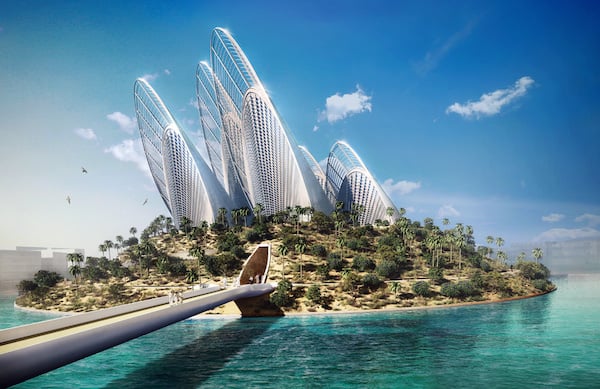
Photo via: Abu Dhabi 2
The museum gets a substantial fee, but is it worth compromising its reputation?

Lorena Muñoz-Alonso

The British Museum has been criticized over plans to lend over 500 significant artifacts from its permanent collection to the Zayed National Museum in Abu Dhabi, which has been accused by human rights groups of being built using a system of “modern slavery,” the Independent reports.
The list of items that will be loaned to the Zayed for up to five years includes valuable Assyrian reliefs, cuneiform tablets, Byzantine objects, Greek and Roman jewels, and Ming dynasty porcelain.
According to the Art Newspaper, the British Museum had initially planned to send pieces from its stores. But the shortlist now includes important pieces classified as “highlights,” which are normally only loaned for short periods of time.
TAN reports that the London-based museum will receive a substantial fee in exchange, which will surely help to handle the cuts in government funding, although a concrete figure has not been disclosed.
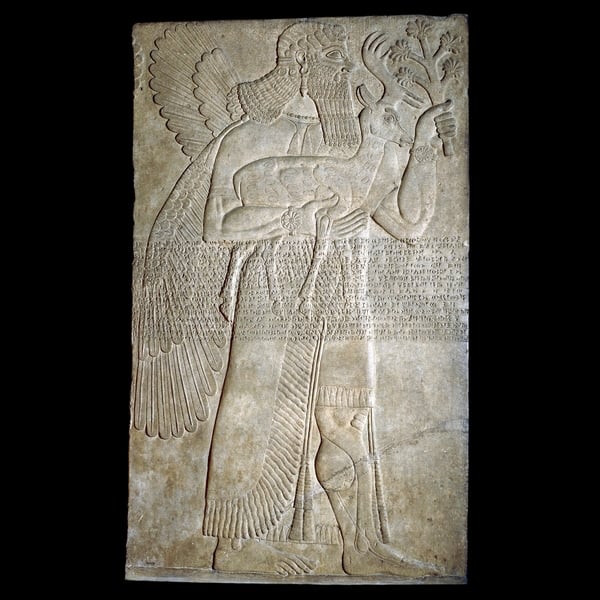
Assyrian stone panel from the palace of Ashurnasirpal II in Nimrod
Photo via: British Museum
“The museums and other developments on Saadiyat Island are all being built on the back of a system of modern slavery,” Sharan Burrow, general secretary of the International Trade Union Confederation, told the Independent. “Any overseas cultural institution collaborating with them has an absolute responsibility to ensure that real action is taken, or face enormous risk to their own reputations and standing,” she added.
A British Museum spokeswoman told the Independent that the museum was working with Abu Dhabi’s Tourism Development and Investment Company, which is overseeing the construction of the Zayed, to ensure that workers were treated properly. She added that the museum’s staff and trustees had visited the site, and that the 500-item list was only a “preliminary pool.”
The Zayed Museum, designed by the British architect Norman Foster and slated to open next year, will showcase the history, culture, and social and economic transformation of the UAE.
It will be the centrepiece of the Saadiyat Island Cultural District, where a number of cultural institutions—including outposts of the Louvre and Guggenheim museums, and NYU—are also being built.
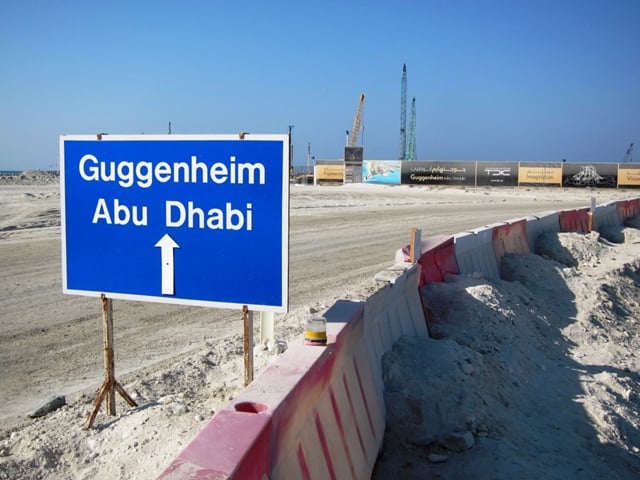
The route to the Guggenheim Abu Dhabi construction site on Saadiyat Island.
Photo: Human Rights Watch.
Thousands of migrant workers have been recruited to that effect, but human rights watchdogs and journalists have consistently complained about the dubious working conditions offered to workers (see What’s Really Going On at Abu Dhabi’s Saadiyat Island?).
These conditions include housing in slums, withholding passports of workers, low wages, and being forced to pay an extortionate “recruiting fee,” according to the Guardian.
The Guggenheim, the Louvre, and NYU have all come under fire for these reasons. Last year, the artist-activist group Gulf Labor earned widespread attention for spectacular protests at the Guggenheim in New York (see Demonstrators at Guggenheim Protest Labor Abuse in Abu Dhabi).
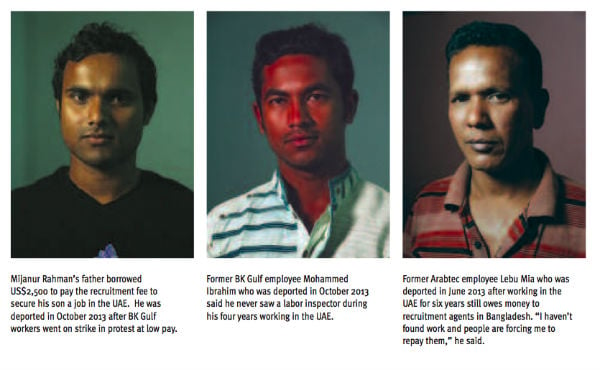
Interviewees from Human Rights Watch’s “Migrant Workers’ Rights on Saadiyat Island in the United Arab Emirates: 2015 Progress Report”
Last month, the group staged protests at the doors of the Peggy Guggenheim Collection in Venice during the Biennale opening week (see Gulf Labor Stages Protest at Peggy Guggenheim Collection in Venice).
The Gulf Labor campaign has made the UAE authorities uncomfortable enough to ban a number of members from the group, including Walid Raad, from entering the UAE (see Walid Raad Third Gulf Labor Artist Who’s Been Refused Entry to the UAE and Sharjah Biennial Artists Issue Open Letter Supporting Gulf Labor Artists Banned from UAE).
The ban has been condemned by museum directors and other art-world figures across the world (see Glenn Lowry Among 60 Global Art World Figures Condemning UAE Travel Bans).
Meanwhile, the neighboring country of Qatar is also in the eye of a media storm regarding the treatment of workers building the infrastructure of the 2022 World Cup in Qatar (see Disgusted Artists Flood Internet with Imagery Mocking FIFA and World Cup Sponsors). An estimated 1,200 migrant workers have died since construction works began in 2010, according to the Washington Post.
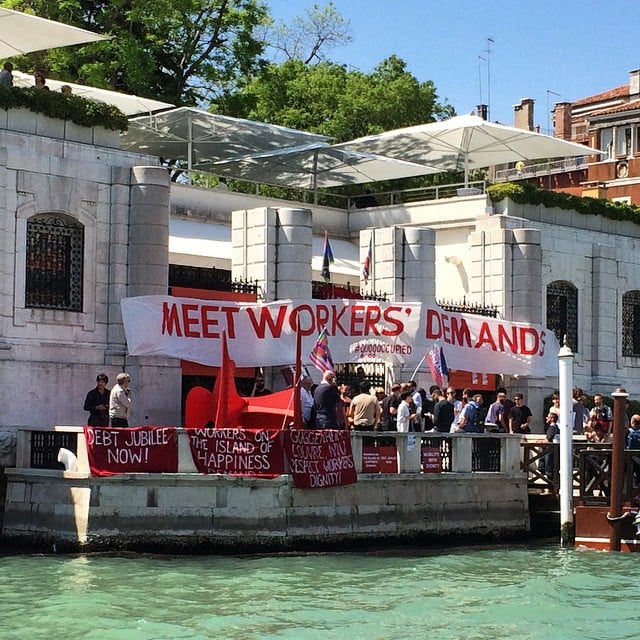
Gulf Labor protesters outside the Peggy Guggenheim Collection in Venice
Photo: Lucia Pizzani via Instagram